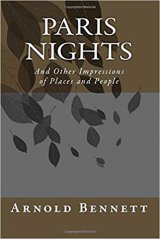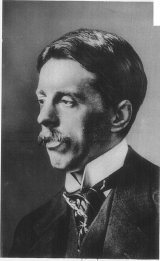Paris Nights and Other Impressions of Places and People Page #10
Enoch Arnold Bennett (27 May 1867 - 27 March 1931) was an English writer. He is best known as a novelist, but he also worked in other fields such as the theatre, journalism, propaganda and films. Bennett was born in a modest house in Hanley in the Potteries district of Staffordshire. Hanley was one of the Six Towns that were joined together at the beginning of the 20th century as Stoke-on-Trent and are depicted as "the Five Towns" in some of Bennett's novels. Enoch Bennett, his father, qualified as a solicitor in 1876, and the family moved to a larger house between Hanley and Burslem.
- Year:
- 1913
- 105,976 Views
During the meal the conversation constantly reverted with pleasure to the question of food; it was diversified by expressions of the host’s joy in his home, and the beings therein; and for the rest it did not ascend higher than heterogeneous personal gossip,--“unstitched,” as the French say. ***** Instead of going into the drawing-room, we went through a bed-chamber, into a small room at the back. By taking a circuitous service-passage, and infringing on the kitchen, we might ultimately have arrived at that room without passing through the bedchamber; but the proper, the ceremonious way to it was through the bedchamber. This trifling detail illuminates the methods of the French architect even when he is building expensively--methods which persist to the present hour. Admirable at façades, he is an execrable planner, wasteful and maladroit, as may be seen even in the most important public buildings in Paris--such as the Town Hall. In arranging the “disposition” of flats, he exhausts himself on the principal apartments, and then, fatigued, lets the others struggle as best they may for light and air and access in the odd corners of space which remain. Of course, he is strong in the sympathy of his clients. It is a wide question of manners, stretching from the finest palaces of France down to the labyrinthine coverts of industrialism. Up to twenty-five years ago, architects simply did not consider the factors of either light or ventilation. I have myself lived in a flat, in one of the best streets of central Paris, of which none of the eight windows could possibly at any period of the year receive a single direct gleam of sunlight. Up to twenty-five years ago, nobody had discovered a reason why, in a domestic interior, a bedroom should not be a highroad.. . . Visualise the magnificent straight boulevard, full of the beautiful horizontal glidings of trams and automobiles; the lofty and stylistic frontages; the great carved doors of the house; the quasi-Oriental entrance and courtyard, shut in from the fracas of the street; the monumental staircase; the spacious and even splendid dining-room; and then the bedroom opening directly off it; and then the still smaller sitting-room opening directly off that; and us there--the ebullient doctor, his elegant and calm wife, the Tante (on a small chair), and myself--sitting round a lamp amid a miscellany of bookcases and oddments. This was the room that the doctor preferred of an evening. He would say, joyously: “C’est le décor home!” ***** A cousin of the host was announced; and his relatives and I smiled archly, with affectionate malice, before he came in; for it was notorious that this cousin, an architect by profession, and a bachelor of forty years standing, had a few days earlier solemnly and definitely “broken” with his petite amie. I knew it. Everybody knew it within the wide family-radius. It was one of those things that “knew themselves.” This call was itself a proof that the cousin had dragged his anchor. Moreover, he embraced his aunt with a certain self-consciousness. He was a tall, dark-bearded man, well dressed in a dark-grey suit--a good specimen of French tailoring, but a French tailor cannot use an iron and he cannot “roll” a collar. A rather melancholy and secretive and flaccid man, but somewhat hardened and strengthened by the lifelong use of a private fortune. They all had money--money of their own, independently of earned money; the wife had money--and I do not think that it occurred to any of them to live up to his or her income; their resources were always increasing, and the reserves that the united family could have brought up to face a calamity must have been formidable. None of them had ever been worried about money, and by reason of their financial ideals they were far more solid than a London family receiving, but spending, thrice their income. Marthe came with another coffee cup, and the cousin, when the hostess had filled it, set it down to go cold, after the French manner. “Well, my boy,” said Tante, whose ancient eyes were sparkling with eagerness. “By what appears, thou art a widower since several days.” “How a widower?” “Yes,” said the host, “it appears that thou art a widower.” And added enthusiastically: “I am pretty content to see thee, my old one.” The hostess smiled at the widower with sympathetic indulgence. “Who has told you?” “What! Who has told us? All Paris knows it!” “Well,” said the cousin, looking at the carpet and apparently communing with himself--he always had an air of self-communing, “I suppose it’s true!” He drank the tenth of a teaspoonful of coffee. “Eh, well, my friend,” the Tante commented. “I do not know if thou hast done well. That did not cost thee too dear, and she had a good-hearted face.” Tante spoke with an air of special intimacy, because she and the cousin had kept house together for some years at one period. “Thou hast seen her, Tante?” the hostess asked, surprised a little out of the calm in which she was crocheting. “Have I seen her? I believe it well! I caught them together once when I was driving in the Bois.” “That was Antoinette,” said the cousin. “It was not Antoinette,” said the Tante. “And thou hast no need to say it. Thou quittedst Antoinette in ‘96, before I had begun to hire that carriage. I recall it to myself perfectly.” “I suppose now it will be the grand spree,” said the hostess, “during several months.” “The grand spree!” Tante broke in caustically. “Have no fear. The grand spree--that is not his kind. It is not he who will scatter his money with those birds. He is not so stupid as that.” She laughed drily. “Is she rosse, the Tante, all the same!” the host, flowing over with good nature, comforted his cousin. Then Marthe entered again: “The children demand monsieur.” The host bounded up from his chair. “What! The children demand monsieur!” he exploded. “At nine o’clock! It is not possible that they are not asleep!” “They say that monsieur promised to return to them after dinner.” “It is true!” he admitted, with a gesture of discovery. “It is true!”
Translation
Translate and read this book in other languages:
Select another language:
- - Select -
- 简体中文 (Chinese - Simplified)
- 繁體中文 (Chinese - Traditional)
- Español (Spanish)
- Esperanto (Esperanto)
- 日本語 (Japanese)
- Português (Portuguese)
- Deutsch (German)
- العربية (Arabic)
- Français (French)
- Русский (Russian)
- ಕನ್ನಡ (Kannada)
- 한국어 (Korean)
- עברית (Hebrew)
- Gaeilge (Irish)
- Українська (Ukrainian)
- اردو (Urdu)
- Magyar (Hungarian)
- मानक हिन्दी (Hindi)
- Indonesia (Indonesian)
- Italiano (Italian)
- தமிழ் (Tamil)
- Türkçe (Turkish)
- తెలుగు (Telugu)
- ภาษาไทย (Thai)
- Tiếng Việt (Vietnamese)
- Čeština (Czech)
- Polski (Polish)
- Bahasa Indonesia (Indonesian)
- Românește (Romanian)
- Nederlands (Dutch)
- Ελληνικά (Greek)
- Latinum (Latin)
- Svenska (Swedish)
- Dansk (Danish)
- Suomi (Finnish)
- فارسی (Persian)
- ייִדיש (Yiddish)
- հայերեն (Armenian)
- Norsk (Norwegian)
- English (English)
Citation
Use the citation below to add this book to your bibliography:
Style:MLAChicagoAPA
"Paris Nights and Other Impressions of Places and People Books." Literature.com. STANDS4 LLC, 2024. Web. 23 Dec. 2024. <https://www.literature.com/book/paris_nights_and_other_impressions_of_places_and_people_110>.




Discuss this Paris Nights and Other Impressions of Places and People book with the community:
Report Comment
We're doing our best to make sure our content is useful, accurate and safe.
If by any chance you spot an inappropriate comment while navigating through our website please use this form to let us know, and we'll take care of it shortly.
Attachment
You need to be logged in to favorite.
Log In